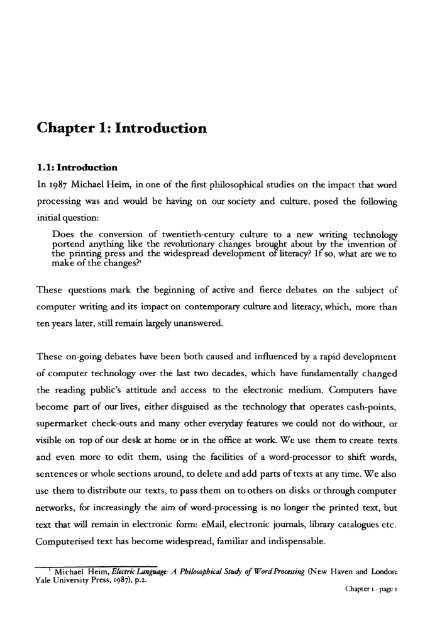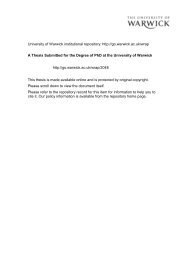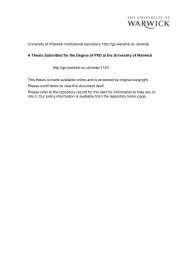From Page to Screen - WRAP: Warwick Research Archive Portal ...
From Page to Screen - WRAP: Warwick Research Archive Portal ...
From Page to Screen - WRAP: Warwick Research Archive Portal ...
Create successful ePaper yourself
Turn your PDF publications into a flip-book with our unique Google optimized e-Paper software.
Chapter 1: Introduction<br />
1.1: Introduction<br />
In 1987 Michael Heim, in one of the first philosophical studies on the impact that word<br />
processing was and would be having on our society and culture, posed the following<br />
initial question:<br />
Does the conversion of twentieth-century culture <strong>to</strong> a new writing technology<br />
portend anything like the revolutionary changes brought about by the invention of<br />
the printing press and the widespread development of literacy? Ifso, what are we <strong>to</strong><br />
make of the changes?'<br />
These questions mark the beginning of active and fierce debates on the subject of<br />
computer writing and its impact on contemporary culture and literacy, which, more than<br />
ten years later, still remain largely unanswered.<br />
These on-going debates have been both caused and influenced by a rapid development<br />
of computer technology over the last two decades, which have fundamentally changed<br />
the reading public's attitude and access <strong>to</strong> the electronic medium. Computers have<br />
become part of our lives, either disguised as the technology that operates cash-points,<br />
supermarket check-outs and many other everyday features we could not do without, or<br />
visible on <strong>to</strong>p of our desk at home or in the office at work. We use them <strong>to</strong> create texts<br />
and even more <strong>to</strong> edit them, using the facilities of a word-processor <strong>to</strong> shift words,<br />
sentences or whole sections around, <strong>to</strong> delete and add parts oftexts at any time. We also<br />
use them <strong>to</strong> distribute our texts, <strong>to</strong> pass them on <strong>to</strong> others on disks orthrough computer<br />
networks, for increasingly the aim of word-processing is no longer the printed text, but<br />
text that will remain in electronic form: eMail, electronic journals, library catalogues etc.<br />
Computerised text has become widespread, familiar and indispensable.<br />
, Michael Heim, Electric Language: A Philosophical Study ofWordProcessing (New Haven and London:<br />
Yale University Press, 1987), p.z.<br />
Chapter I - page I





